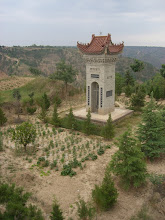| In August I spent a month in the USA for home leave and was inspired by a fellow RPCV from Africa. He is a biology teacher and told me about a fishing stimulation he used in his class where the students explored the ideas behind the tragedy of the commons. What happens when there is a common resource used by many people? What strategies can be applied to protect common resources preventing the overuse of limited resources? This Friday the first meeting of science club will be held and the Chinese students will do the fishing stimulation. A group of four students will have access to one pond of of sixteen fish (candy) to fish from using straws. Each student must take two fish or their family will starve and die. Without talking, the students can fish for one minute which represents one year. When the minute is over, the fish left in the pond can reproduce. For every fish that is left, one baby will be added. There can only be a maximum of sixteen fish in the pond at a time. Then the students will fish for another year. I wonder will Chinese students fish differently than American students? In American schools after several years of fishing, usually students will empty their ponds of fish. At my university, students have a habit of living in dorm rooms with eight people, of eating communal meals, and of copying each other rather than doing their own thing. Sometimes I feel like the students are a collective with a single mind. At knitting club instead of each student eating an orange, eight of them will share one orange. I always feel guilty eating my own orange when they give a slice to everyone. Plus China's one child policy is an example of using government regulations to try to prevent the exploitation of their limited resources, sacrificing for the greater good. Another thing is, privatization is new in China; although, land is not privately owned in China. It is owned by the government. Will these things influence the way the students approach fishing their ponds? Will each student copy each other and ONLY take two fish every year? Will they without talking to each other see what the greater good is and only take what they need not to starve? We will see on Friday. If you are interested in doing this with your students, here are some websites with the Fishing Stimulation Labs: |
Thursday, November 11, 2010
Science Club
Subscribe to:
Post Comments (Atom)

No comments:
Post a Comment